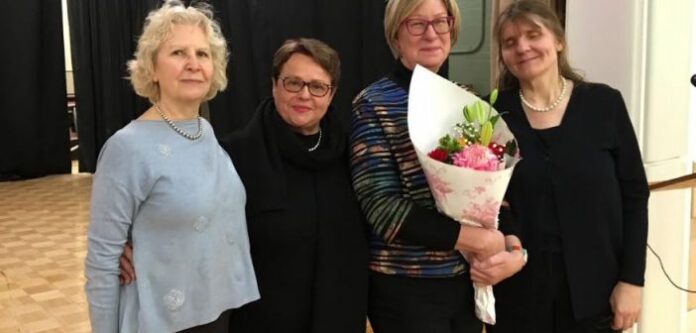
TORONTO
On Sunday, January 12 , 2020, the Lithuanian House hosted an afternoon with Laima Vince (Sruoginis), an author of Lithuanian descent living in the United States.
On behalf of the hosts, Ausra Karka introduced the audience to Laima Vince and presented her biography. The author writes prose, poetry, plays and translations, and is also a creative writing instructor, painter, and mother of three. Born in New Jersey, Laima was raised in a Lithuanian family and community. Her maternal grandfather, Anicetas Simutis, was the Consul-General of Lithuania in New York during the Soviet occupation of Lithuania until Lithuanian independence was re-established in 1990. In 1991 he was appointed to the United Nations and worked there as the first representative of Lithuania until 1994. From her mother, an artist born in New York, Laima inherited a talent for expressing her worldview through image and colour. Laima was a student at the Vasario 16 (February 16) high school in Germany, and graduated from Rutgers University in the US, having studied English, German and Fine Art. Later she received a Master‘s degree in Creative Writing from Columbia University in New York, and further studied non-fiction writing at the University of New Hampshire. Laima currently teaches creative writing at the University of Southern Maine.
Laima Vince speaks fluent Lithuanian and taught Poetry Translation Theory and Creative Writing at the English Department of Vilnius University from 1995 to 1997 under the Fullbright Program. She returned to work there from 2007 to 2009, then taught at the International American School in Vilnius for two years. From 2013-2015 she was head of the English Department of the IAS in Hong Kong, and also worked (and still works) in China.
Laima has received a number of literary prizes in the United States. Since 2011 she has been a member of the Lithuanian Writers‘ Union. Aside from her literary work, Laima Vince has written three books about Lithuania: “Lenin‘s Head on a Platter“, “The Snake in the Vodka Bottle“, “Journey into the Backwaters of the Heart“. In addition to two Fullbright Scholarships for creative writing, she has received a National Literature Foundation prize and a PEN Translation Fund grant. Her current work writing a PhD thesis in Vilnius is a comparative study of Lithuanian literature written in North America.
Ausra Karka then introduced Maryte Balaisyte-Miller, Laima‘s classmate from Vasario 16 High School, who shared memories of being at the school with the future author.
The author read excerpts in English and in Lithuanian from her books “This is not My Sky“, and “Journey into the Backwaters of the Heart“.
With its telling descriptions and heartfelt dialogue, the first book reveals the plight of immigrants in a new country and foreign culture. It touches many who have been forced to leave their homeland. The second book documents the emotional stories of Lithuanian freedom fighters. Laima Vince also read a vivid and memorable excerpt about N. Luksiene-Paronetto‘s meeting with a villager from Dzukija, in whose home her family had harboured well-known resistance leaders J. Luksa-Daumantas and A. Ramanauskas-Vanagas.

 The author also read a very moving love poem in Lithuanian and English, written by freedom-fighter Jonas Kadzionis to his wife Malvina. They had both been arrested and exiled for 25 years, but to different regions of Russia. Malvina had given birth to their child in an underground bunker. Laima Vince spoke about the disturbing reality of the life of Lithuanian freedom-fighters, far different from the fictionalized heroes portrayed in various writings. The freedom-fighters, despised by many, living on the run, suffering the rigours of daily life as well as brutal persecution and punishment at the hands of the occupiers, were saved only by love – love for fellow-man and family. The characters in the book exemplify the power of loving and being loved.
The author also read a very moving love poem in Lithuanian and English, written by freedom-fighter Jonas Kadzionis to his wife Malvina. They had both been arrested and exiled for 25 years, but to different regions of Russia. Malvina had given birth to their child in an underground bunker. Laima Vince spoke about the disturbing reality of the life of Lithuanian freedom-fighters, far different from the fictionalized heroes portrayed in various writings. The freedom-fighters, despised by many, living on the run, suffering the rigours of daily life as well as brutal persecution and punishment at the hands of the occupiers, were saved only by love – love for fellow-man and family. The characters in the book exemplify the power of loving and being loved.
Discussions after the reading included Lithuanian Canadian authors Antanas Sileika, Irene Guilford and John Creedon (author of the recently published “Caught Between Two Devils“. Opinions were exchanged about the purpose and meaning of creative writing studies, the connection between history and literature, the universality of historical experience and the differences between emotional truth and historical truth.
Audience members were eager to continue discussions with the author after the meeting over coffee and during her book-signing.
SK





























